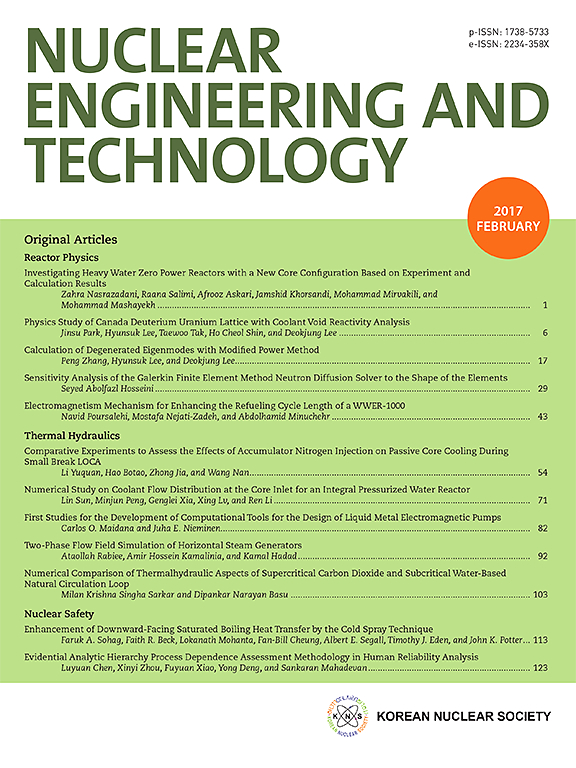Leveraging machine learning for accurate DNBR prediction using python
IF 2.6
3区 工程技术
Q1 NUCLEAR SCIENCE & TECHNOLOGY
引用次数: 0
Abstract
This study investigates the viability of using Python scikit-learn packages, specifically regression techniques, to forecast the departure from nucleate boiling ratio (DNBR) using previously published datasets as reference. These datasets were generated using the COBRA-IV computer code under specific operational conditions for pressurized water reactors, and are categorized into two groups: steady-state, encompassing cases 1 and 2, and transient-state which includes both the loss of flow accident (LOFA) and rod cluster control assembly (RCCA) withdrawal scenarios. Due to the dataset's small size, this study also addressed the difficulties encountered with enhancing the accuracy of regression models. Several approaches were investigated in an attempt to improve the regression's accuracy, these include feature selection and hyperparameters tuning analysis for each regression model. The use of noise perturbation with a realistic standard deviation proved to be the most successful strategy for increasing regression accuracy, especially with small datasets, by interpolating the gaps between observations thus increasing their size. This approach's algorithm was evaluated using metrics such as R2 score, mean square error (MSE) and mean absolute error (MAE). The evaluation metrics demonstrated that the DTReg model, after incorporating noise, achieved significantly higher accuracy compared to previously referenced artificial neural network (ANN) models, highlighting the substantial impact of noise perturbation on refining the model's predictive capabilities. Overall, this approach not only improved performance for the steady-state cases but also enhanced accuracy for transient datasets, ultimately demonstrating the effectiveness of noise perturbation in overcoming the limitations of small datasets.
求助全文
约1分钟内获得全文
求助全文
来源期刊

Nuclear Engineering and Technology
工程技术-核科学技术
CiteScore
4.80
自引率
7.40%
发文量
431
审稿时长
3.5 months
期刊介绍:
Nuclear Engineering and Technology (NET), an international journal of the Korean Nuclear Society (KNS), publishes peer-reviewed papers on original research, ideas and developments in all areas of the field of nuclear science and technology. NET bimonthly publishes original articles, reviews, and technical notes. The journal is listed in the Science Citation Index Expanded (SCIE) of Thomson Reuters.
NET covers all fields for peaceful utilization of nuclear energy and radiation as follows:
1) Reactor Physics
2) Thermal Hydraulics
3) Nuclear Safety
4) Nuclear I&C
5) Nuclear Physics, Fusion, and Laser Technology
6) Nuclear Fuel Cycle and Radioactive Waste Management
7) Nuclear Fuel and Reactor Materials
8) Radiation Application
9) Radiation Protection
10) Nuclear Structural Analysis and Plant Management & Maintenance
11) Nuclear Policy, Economics, and Human Resource Development
 求助内容:
求助内容: 应助结果提醒方式:
应助结果提醒方式:


